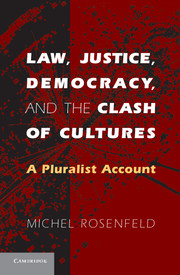Book contents
- Frontmatter
- Contents
- Introduction
- Part I Liberal Justice and Fleeting Specters of Unity
- Part II E Pluribus Unum?
- 4 Spinoza’s Dialectic and the Paradoxes of Tolerance
- 5 The Clash Between Deprivatized Religion and Relativized Secularism
- 6 Dworkin and the One Law Principle
- Part III Can Pluralism Thrive in Times of Stress?
- Bibliography
- Index
4 - Spinoza’s Dialectic and the Paradoxes of Tolerance
Can Unity Be Willed out of Necessity?
from Part II - E Pluribus Unum?
Published online by Cambridge University Press: 05 June 2012
- Frontmatter
- Contents
- Introduction
- Part I Liberal Justice and Fleeting Specters of Unity
- Part II E Pluribus Unum?
- 4 Spinoza’s Dialectic and the Paradoxes of Tolerance
- 5 The Clash Between Deprivatized Religion and Relativized Secularism
- 6 Dworkin and the One Law Principle
- Part III Can Pluralism Thrive in Times of Stress?
- Bibliography
- Index
Summary
For comprehensive pluralism to be truly pluralistic all the way up and all the way down, it must successfully harmonize the one and the many. Monism starts from the one and subordinates the many to it, unduly suppressing the differences that animate the distinct plurality of the many. Relativism, for its part, starts from the many, but altogether denies any possibility of inter-communal or transcommunal unity. Comprehensive pluralism, in contrast, as we have seen, does provide the means to reconcile the one and the many, by starting with a full accounting of the entire spectrum of plurality of the many and then confronting the latter with the need to accommodate imperatives deriving from its second-order norms. Accordingly, comprehensive pluralism seems best suited to harmonize unity and plurality, but thus far the focus has been on the highest levels of abstraction, leaving open whether and how such harmonization could be put into practice in concrete sets of circumstances.
The aim of the chapters in Part II of the book is to examine particular attempts to arrive at unity starting out of plurality and to reconcile the two in concrete sets of circumstances. Each of the three chapters in this part treats a concrete challenge that is different from those broached in the other chapters, but together they illustrate both the potential and the pitfalls in the quest for extracting unity out of plurality and for finding ways to harmonize the two. This chapter is devoted to Spinoza’s theory of tolerance; Chapter 5, to the search for constitutional unity amidst religious plurality; and Chapter 6, to Dworkin’s search for interpretive unity amidst the clash of interpretations that is typical when dealing with hard cases. Admittedly, both Spinoza and Dworkin are monists, but, as we shall see, they both truly confront plurality in their respective pursuits of tolerance and interpretive unity, and they both take such plurality seriously.
- Type
- Chapter
- Information
- Law, Justice, Democracy, and the Clash of CulturesA Pluralist Account, pp. 125 - 148Publisher: Cambridge University PressPrint publication year: 2011



